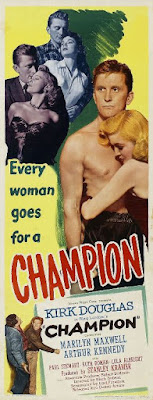Champion
Now that the year is half over I've got to hustle to get around to all the centenaries celebrated this year. Great artists born in 1916 include Gregory Peck, Shirley Jackson, Walker Percy, Shelby Foote, Jackie Gleason, Harry James, and two who are still alive: Olivia De Havilland, who just turned 100 a few days ago, and Kirk Douglas, who will be 100 in December.
Douglas was a great movie star who still manages to be unsung--he never won an Oscar in competition. His typical role was of a man with great intensity--impressionists usually zeroed in on moments of anger. His later years were marked by grand, historical films, such as Spartacus, probably his most famous role. But earlier in his career he played many roles of more subtlety, including noirs like Out of the Past.
His first starring role was as a boxer in 1949's Champion, directed by Mark Robson. Here is all of what Douglas offered--a handsome, vigorous man, but also a heel. He plays Midge Kelly, a man from poverty, who accidentally ends up a boxer. He is loved by his crippled brother (Arthur Kennedy) and has a manager (Paul Stewart) devoted to him, but he turns against them when he has a chance to get ahead.
Douglas, who also grew up in poverty (his memoir is called The Ragman's Son) may have found something to identify in Kelly, although he was surely a nicer man than this character. This guy is pugnacious and cocky, a scrapper. When he find himself looking for work in a club he is asked to fill in for a scratched boxer. He has no technique, so loses, but Stewart sees something in him and offers him training. Douglas and Kennedy are partners in a diner, so he says no, but when he finds out that was a scam, he ends up putting on the gloves.
Kelly's treatment of women is also very harsh in this film. He romances the daughter of the diner owner (Ruth Roman). They are forced to marry, but as soon as the ceremony is over he walks out. When he beats the number one challenger (against orders from the bigwigs who fix the fights) he takes his girl (Marilyn Maxwell), who is only interested in money. Later, he will dump Stewart and sign with another manager, and then takes his woman (Lola Albright), only to break her heart.
So what we have here is a thoroughly unlikeable character, but it's through Douglas' force of will that if he isn't somebody we'd like as a friend, it's still someone we want to watch. He becomes champ, but the climax of the film is when he defends the title against the man he beat early on. In a twist for a boxing film, many viewers might actually be rooting against Douglas. I won't spoil it here, but the ending was a surprise, which most boxing films do not have.
I'll be watching more Douglas films that I haven't seen before or at least in a very long time. Watch this space.
Douglas was a great movie star who still manages to be unsung--he never won an Oscar in competition. His typical role was of a man with great intensity--impressionists usually zeroed in on moments of anger. His later years were marked by grand, historical films, such as Spartacus, probably his most famous role. But earlier in his career he played many roles of more subtlety, including noirs like Out of the Past.
His first starring role was as a boxer in 1949's Champion, directed by Mark Robson. Here is all of what Douglas offered--a handsome, vigorous man, but also a heel. He plays Midge Kelly, a man from poverty, who accidentally ends up a boxer. He is loved by his crippled brother (Arthur Kennedy) and has a manager (Paul Stewart) devoted to him, but he turns against them when he has a chance to get ahead.
Douglas, who also grew up in poverty (his memoir is called The Ragman's Son) may have found something to identify in Kelly, although he was surely a nicer man than this character. This guy is pugnacious and cocky, a scrapper. When he find himself looking for work in a club he is asked to fill in for a scratched boxer. He has no technique, so loses, but Stewart sees something in him and offers him training. Douglas and Kennedy are partners in a diner, so he says no, but when he finds out that was a scam, he ends up putting on the gloves.
Kelly's treatment of women is also very harsh in this film. He romances the daughter of the diner owner (Ruth Roman). They are forced to marry, but as soon as the ceremony is over he walks out. When he beats the number one challenger (against orders from the bigwigs who fix the fights) he takes his girl (Marilyn Maxwell), who is only interested in money. Later, he will dump Stewart and sign with another manager, and then takes his woman (Lola Albright), only to break her heart.
So what we have here is a thoroughly unlikeable character, but it's through Douglas' force of will that if he isn't somebody we'd like as a friend, it's still someone we want to watch. He becomes champ, but the climax of the film is when he defends the title against the man he beat early on. In a twist for a boxing film, many viewers might actually be rooting against Douglas. I won't spoil it here, but the ending was a surprise, which most boxing films do not have.
I'll be watching more Douglas films that I haven't seen before or at least in a very long time. Watch this space.



Comments
Post a Comment